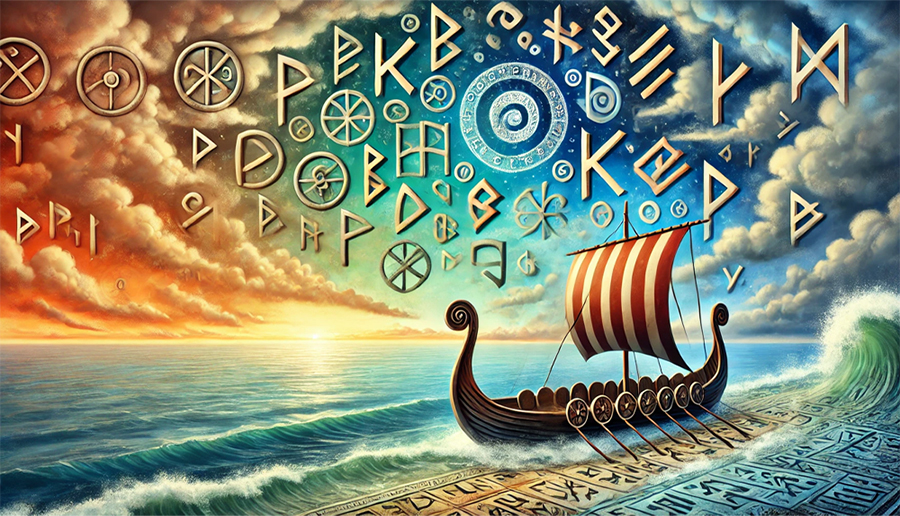Viking Blog
A Viking’s Tongue: 13 Old Norse Words We Still Use Today
The Vikings were much more than fierce warriors and skilled seafarers. Their impact on Europe goes beyond their conquests and sagas. The Vikings’ language, Old Norse, is a lasting legacy. It has had a significant impact on many modern languages, especially English.
In the Viking Age (late 8th to 11th centuries), Norse raiders and settlers often interacted with the Anglo-Saxons in England. This caused a major language exchange, especially in the Danelaw, the Norse-controlled region. As a result, many Old Norse words entered Old English. They are now part of modern English.
Here are 13 fascinating Viking terms. They have survived the centuries and are still in common use.
1. Sky:
The Old English word for “sky” was “heofon” (related to “heaven”). The Old Norse word “ský,” meaning “cloud,” eventually took the place of the earlier term. This shift reflects the significant influence of Norse on English vocabulary.
2. Egg:
This everyday word comes directly from the Old Norse egg, replacing the Old English æg. It’s a testament to the pervasive impact of Old Norse on even the most basic elements of English vocabulary.
3. Knife:
The Old Norse knífr gives us “knife.” It reflects the Vikings’ skill in crafting weapons and tools. Related words like “knives” and the verb “to knife” also derive from this Norse origin.
4. Window:
This word paints a vivid picture of its origin. From the Old Norse vindauga, meaning “wind eye.” It offers a vivid description of an opening that allows light and air to enter.
5. Husband:
From the Old Norse húsbóndi, meaning “master of the house,” this word reveals much about Viking society and household roles. The word bóndi originally meant “farmer” or “landowner.” It shows the importance of agriculture in their society.
6. Thursday:
A direct link to Norse mythology, “Thursday” comes from the Old Norse Þórsdagr, meaning “Thor’s day.” This is a clear example of how Viking mythology has shaped our modern calendars.
7. Berserk:
Meaning “frenzied” or “out of control,” this word originates from the Old Norse berserkr. Berserkers were fierce Viking warriors. They fought in a trance-like rage from rituals. These included wearing animal skins and consuming hallucinogenic drugs.
8. Leg:
The Old Norse word leggr replaced “shank” in many contexts. This shows the deep integration of Norse vocabulary into English.
9. Ransack:
This word means “to search in a thorough and destructive manner.” It comes from the Old Norse rannsaka, which meant “to search a house.” It originally referred to the act of searching for stolen goods. Its meaning evolved to include the pillaging associated with Viking raids.
10. Fellow:
This word, meaning “companion” or “comrade,” derives from the Old Norse félagi. It shows the communal, cooperative aspects of Viking society. Strong bonds and partnerships are essential.
11. Hell:
Christian theology shapes the modern idea of “hell.” But it comes from the Old Norse hel, the name of the underworld in Norse mythology and its ruler. Hel in Norse mythology was not a place of eternal torment; instead, it served as a realm for the dead.
12. Slaughter:
This word means “the killing of many people or animals.” It comes from the Old Norse slátr, meaning “butchery” or “killing.” It reflects the violent, martial aspects of Viking life.
13. Thing:
This word has undergone a fascinating linguistic journey. From the Old Norse þing, meaning “assembly,” it originally meant a governing council. Today, “thing” can mean any object, as in “thingamajig.”
Beyond these 13 words, many other common English words have Old Norse roots, including:
- Anger
- Awkward
- Bag
- Birth
- Cake
- Call
- Cast
- Die
- Dream
- Get
- Give
- Hit
- Law
- Loose
- Low
- Raise
- Root
- Score
- Scathe
- Skin
- Take
- They
- Their
- Them
- Ugly
- Want
- Wrong
The Vikings’ language shows their deep impact on the cultures they met. These words glimpse into the Viking Age’s daily life and beliefs. They remind us of the Vikings’ lasting influence on our language. These words survive in modern English. They show the lasting impact of cultural connections and historical encounters.

